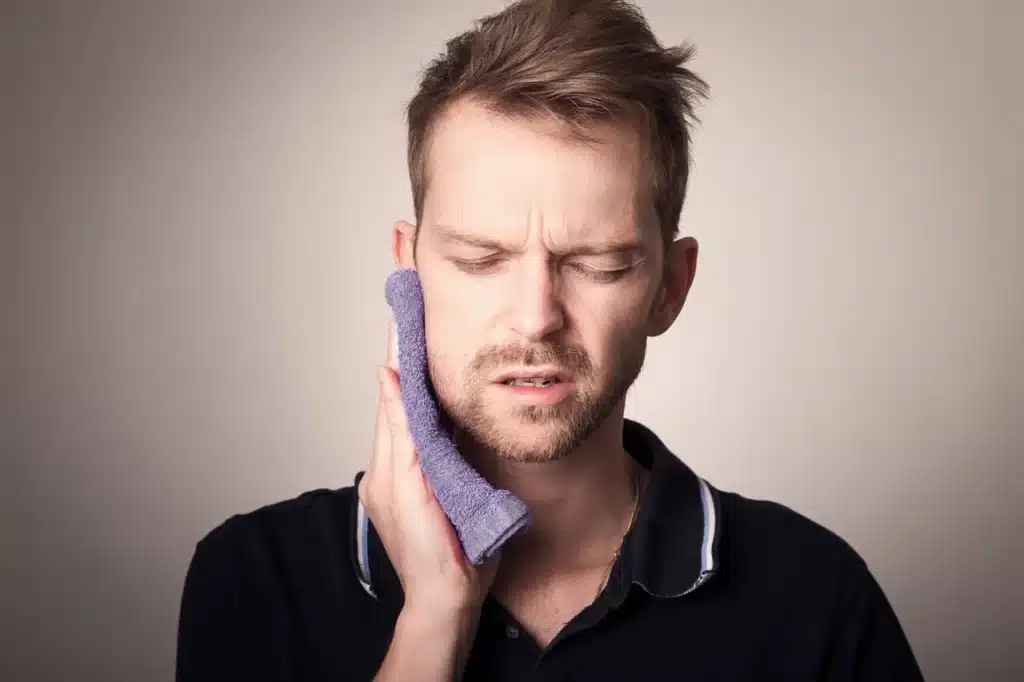Following post-extraction instructions for wisdom teeth can help you reduce pain and speed up recovery. Read more to know the do’s and don’ts after a wisdom tooth extraction operation and save yourself from serious complications.
Instructions
Here are the post-extraction instructions for wisdom teeth. Follow them carefully to avoid any tooth and gum infections.
Bleeding After Wisdom Tooth Extraction
After removing your wisdom teeth, it’s normal to have slight bleeding and see some redness in your saliva. But if you notice a lot of bleeding, here’s the post-extraction instructions for wisdom teeth:
- Gently remove any old blood clots from your mouth.
- Place clean gauze over the bleeding area and bite firmly for 30 to 40 minutes.
- Keep replacing the gauze with new, clean gauze every 30 to 40 minutes.
- If the bleeding continues, you can bite on a cold, damp tea bag for 30 to 40 minutes. Afterward, take the tea bag out and leave the area alone.
- If bleeding is still a big problem, you must call your dentist.
Also, do not talk too much, use a straw, or chew too forcefully, as these things can worsen the bleeding.
Swelling After Wisdom Tooth Extraction
It’s normal to have swelling after any surgery, like removing your wisdom teeth. Swelling depends on how extensive the surgery is and your own body. It can happen around your mouth, jaw, cheeks, and even below your eyes. The swelling usually worsens about 2 to 3 days after the wisdom tooth surgery.
Follow the post-extraction instructions for wisdom teeth to reduce the swelling around the extraction area:
- In the first 24 hours, put ice packs on the outside of your face near where you had the surgery.
- Leave the ice on for 20 to 30 minutes, then take a 20 to 30 minute break in between and repeat the process.
- Sit straight and not lie flat on your back on the first day. It can help reduce swelling.
- Your doctor might give you some anti-inflammatory medicine like dexamethasone. Follow the instructions on the bottle for how to take it.

Pain After Wisdom Tooth Extraction
Medications are required for pain relief after getting your wisdom tooth extraction. Take 400–600 mg of Ibuprofen every 6–8 hours, as it helps with pain and reduces inflammation. If you can’t take ibuprofen, take 1–2 regular Tylenol tablets every 4–6 hours.
You can use numbing gels at least 4–6 times daily on the spot where the tooth was removed in the first few days. Apply a small amount on the wounded area, and keep your tongue away from it. These gels contain benzocaine and also help with pain and healing.
Be careful because some pain medicines can make you feel drowsy, dizzy, or confused, so don’t drive or use machinery. Avoid alcohol while taking these medications because alcohol interacts negatively with post-extraction medicine.
Diet After Wisdom Tooth Extraction
If you were given IV sedation or general anesthesia for your wisdom tooth removal, you should start with liquids when you begin eating. Then, as you feel comfortable, you can slowly introduce solid foods into your diet. Ensure you drink enough fluids, eat well to avoid dehydration, and follow the post-extraction instructions for wisdom teeth. Get a balanced diet plan for what to eat after the extraction procedure.

Oral Hygiene After Wisdom Tooth Extraction
When you remove your wisdom teeth, it’s best not to rinse your mouth. However, starting from the day after the surgery, you should follow the post-extraction instructions for wisdom teeth and rinse gently with warm salt water after every meal. You can also start brushing your teeth the day after the extraction, but be cautious not to harm the area where the surgery was performed.
Bruising After Wisdom Tooth Extraction
After surgery, it’s normal for some patients to see bruising or a change in skin color around the surgical areas. It is a part of the healing process and might take a few days to go away.
Jaw Tightness After Wisdom Tooth Extraction
It’s common to experience this after surgery, and it will improve as time passes. Sometimes, you might be taught exercises to help you open your jaw wider but keep following post-extraction instructions for wisdom teeth.
Nausea After Wisdom Tooth Extraction
After having IV sedation or general anesthesia, some people might feel queasy and throw up. Don’t take your medications when your stomach is empty to prevent this. If you feel nauseous, wait a bit before taking your meds. Stay hydrated and drink liquids.
Pain medications can make you feel sick. If that happens, stop taking them and see if the nausea disappears. Contact your dentist for more post-extraction instructions for wisdom teeth if you keep feeling sick and throwing up.
Conclusion
Carefully follow the post-extraction instructions for wisdom teeth, and always consult your dentist if there are any severe complications. Contact us for more details about wisdom tooth extraction and the food you must take after oral surgery to avoid oral infections.


